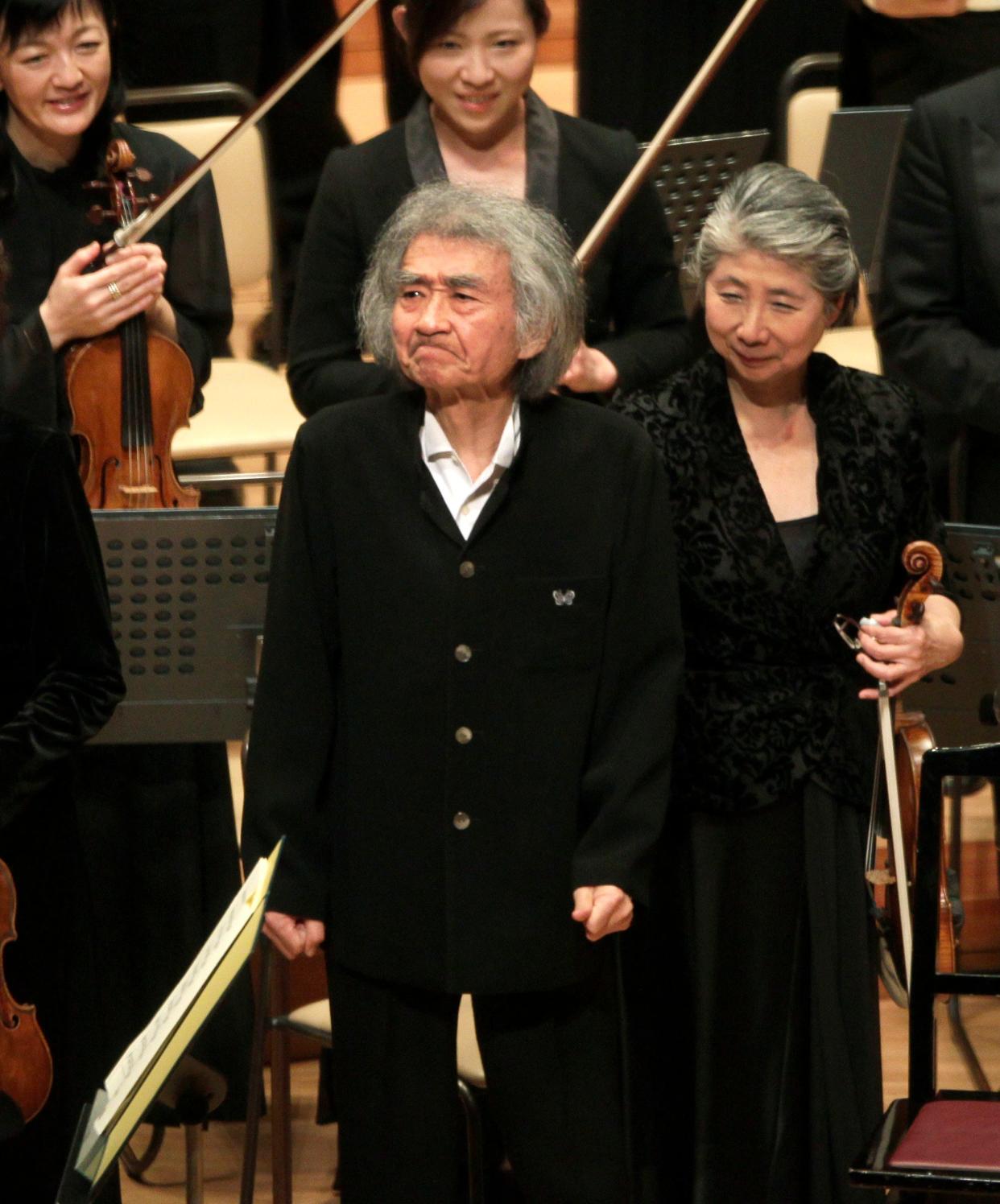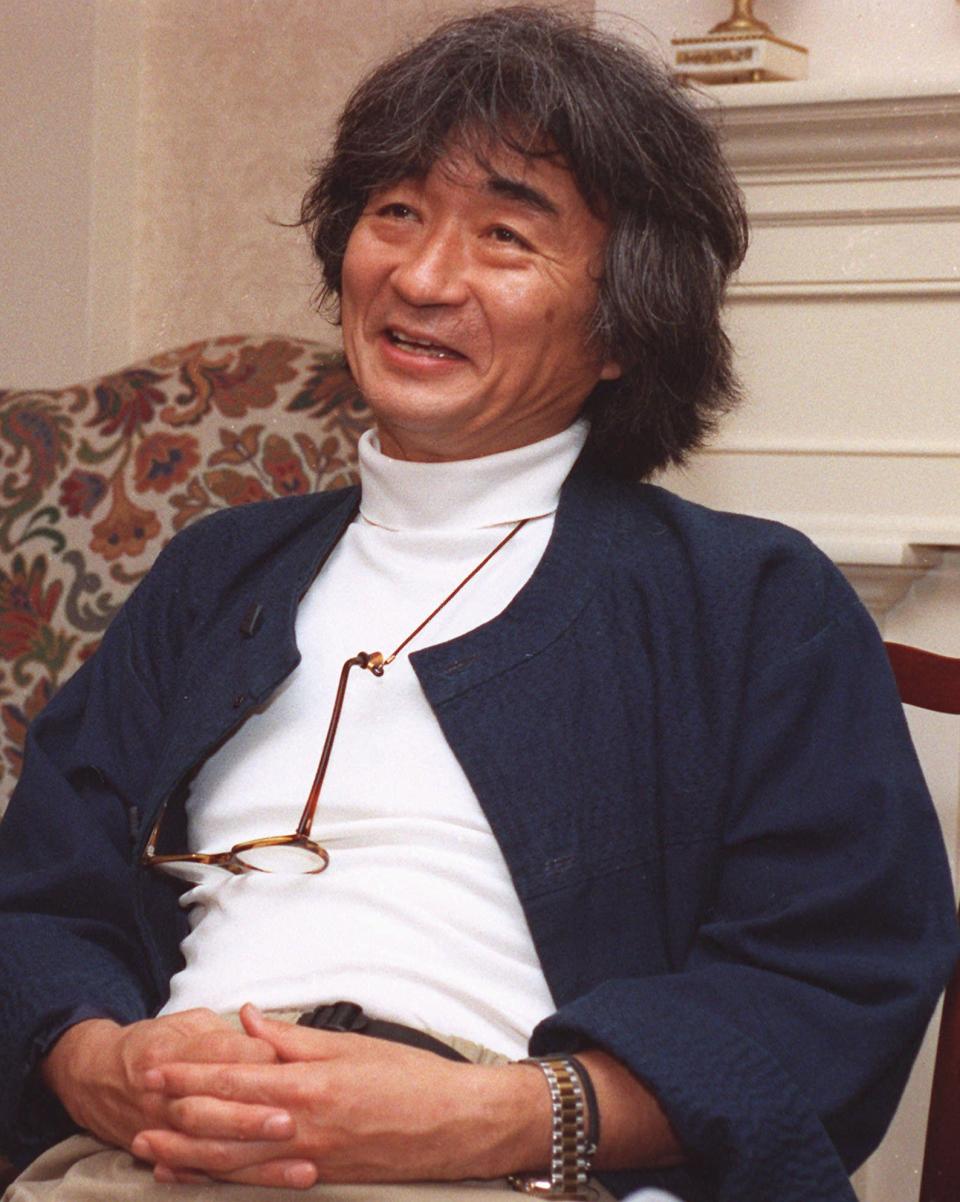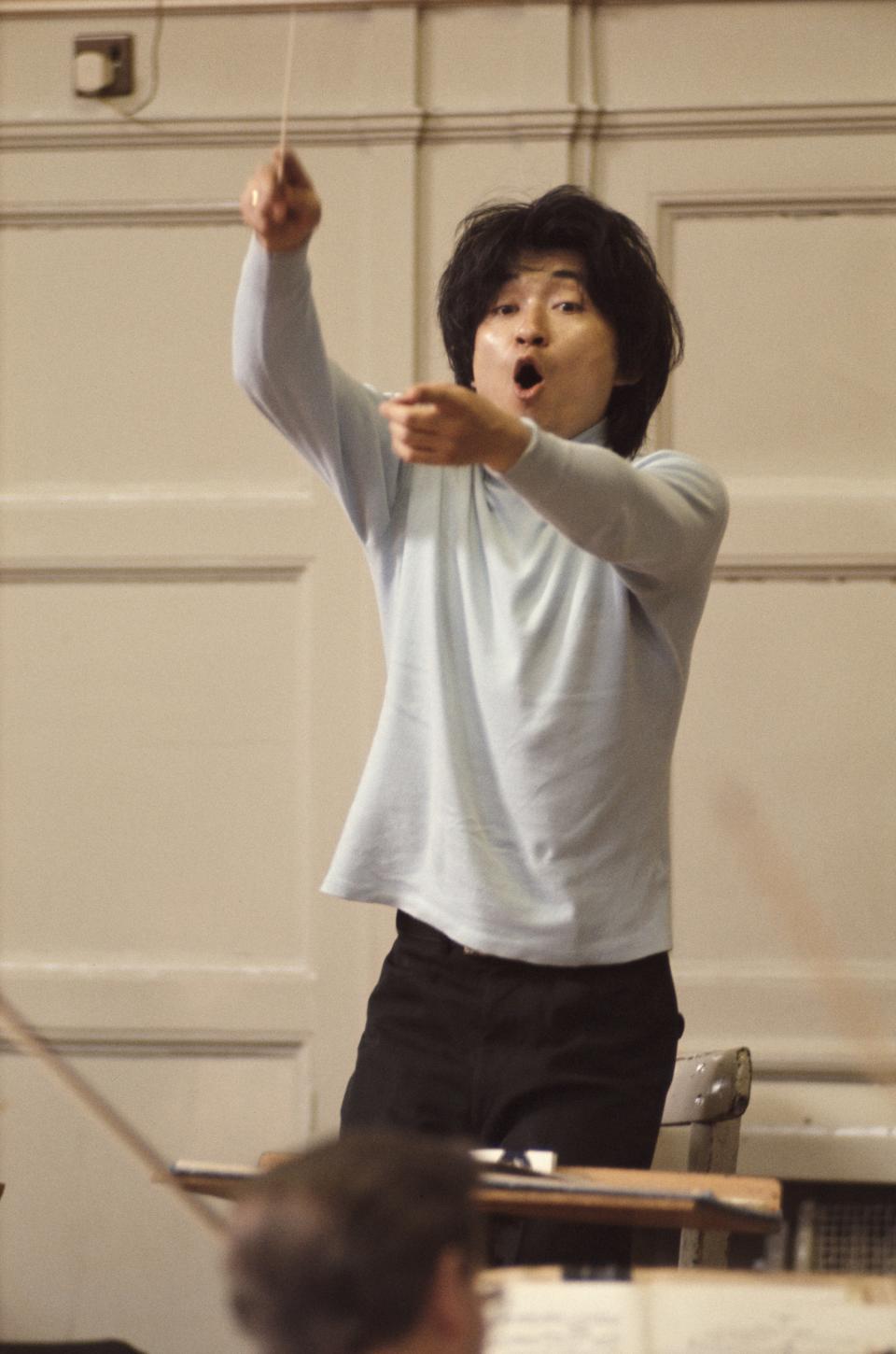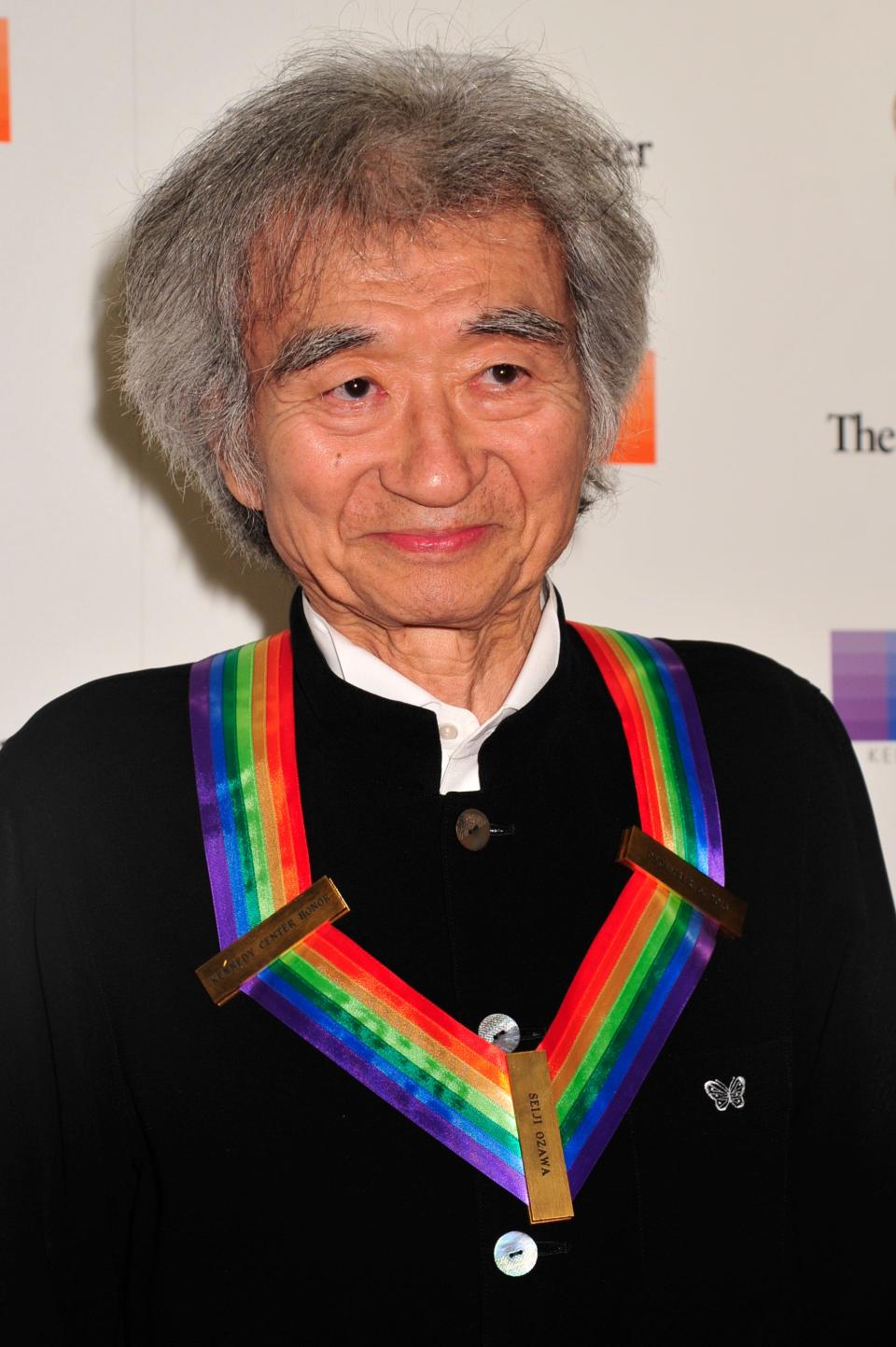Seiji Ozawa, acclaimed Japanese conductor of the Boston Symphony Orchestra, dies at 88

- Oops!Something went wrong.Please try again later.
- Oops!Something went wrong.Please try again later.
TOKYO — Seiji Ozawa, the Japanese conductor who amazed audiences with the lithe physicality of his performances during three decades at the helm of the Boston Symphony Orchestra, has died, his management office said Friday. He was 88.
The internationally acclaimed maestro, with his trademark mop of salt-and-pepper hair, led the BSO from 1973 to 2002, longer than any other conductor in the orchestra’s history. From 2002 to 2010, he was the music director of the Vienna State Opera.
He died of heart failure Tuesday at his home in Tokyo, according to his office, Veroza Japan.
He remained active in his later years, particularly in his native land. He was the artistic director and founder of the Seiji Ozawa Matsumoto Festival, a music and opera festival in Japan. He and the Saito Kinen Orchestra, which he co-founded in 1984, won the Grammy for best opera recording in 2016 for Ravel’s “L’Enfant et Les Sortileges” (“The Child and the Spells”).
In 2022, he conducted his Seiji Ozawa Matsumoto Festival for the first time in three years to mark its 30th anniversary. That turned out to be his last public performance.

Ozawa exerted enormous influence over the BSO during his tenure. He appointed 74 of its 104 musicians and his celebrity attracted famous performers including Yo-Yo Ma and Itzhak Perlman. He also helped the symphony become the biggest-budget orchestra in the world, with an endowment that grew from less than $10 million in the early 1970s to more than $200 million in 2002.
When Ozawa conducted the Boston orchestra in 2006 — four years after he had left — he received a hero’s welcome with a nearly six-minute ovation.
Ozawa was born Sept. 1, 1935, to Japanese parents in Manchuria, China, while it was under Japanese occupation.
After his family returned to Japan in 1944, he studied music under Hideo Saito, a cellist and conductor credited with popularizing Western music in Japan. Ozawa revered him and formed the Saito Kinen (Saito Memorial) Orchestra in 1984 and eight years later founded the Saito Kinen Festival — renamed the Seiji Ozawa Matsumoto Festival in 2015.
Ozawa first arrived in the United States in 1960 and was quickly hailed by critics as a brilliant young talent. He attended the Tanglewood Music Center and was noticed by Leonard Bernstein, who appointed him assistant conductor of the New York Philharmonic for the 1961-62 season. After his New York debut with the Philharmonic at age 25, The New York Times said “the music came brilliantly alive under his direction.”
He directed various ensembles including the San Francisco Orchestra and the Toronto Symphony Orchestra before beginning his tenure in Boston in 1970.

At the time there were few nonwhite musicians on the international scene. Ozawa embraced the challenge and it became his lifelong passion to help Japanese performers demonstrate they could be first-class musicians. In his 1967 book “The Great Conductors,” critic Harold C. Schonberg noted the changing ranks of younger conductors, writing that Ozawa and Indian-born Zubin Mehta were the first Asian conductors “to impress one as altogether major talents.”
Ozawa had considerable star quality and crossover appeal in Boston, where he was a well-known fan of the Red Sox and Patriots sports teams. In 2002, Catherine Peterson, executive director of Arts Boston, a nonprofit group that markets Boston’s arts, told The Associated Press that “for most people in this community, Seiji personifies the Boston Symphony.”
Ozawa is largely credited with elevating the Tanglewood Music Center, a music academy in Lenox, Massachusetts, to international prominence. In 1994, a 1,200-seat, $12 million music hall at the center was named for him.
His work at Tanglewood was not without controversy. In 1996, as music director of the orchestra and its ultimate authority, he decided to move the respected academy in new directions. Ozawa ousted Leon Fleisher, the longtime director of Tanglewood, and several prominent teachers quit in protest.
Despite glowing reviews for his performances in Europe and Japan, American critics were increasingly disappointed in the later years of his tenure with the BSO. In 2002, Anthony Tommasini of The New York Times wrote that Ozawa had become, after a bold start, “an embodiment of the entrenched music director who has lost touch.”
Many of the orchestra’s musicians agreed and even circulated an anti-Ozawa newsletter claiming he had worn out his welcome in Boston.
Ozawa won two Emmy awards for TV work with the Boston Symphony Orchestra — the first in 1976 for the BSO’s PBS series “Evening at Symphony” and the second in 1994, for Individual Achievement in Cultural Programming, for “Dvorak in Prague: A Celebration.”

Ozawa held honorary doctorates of music from the University of Massachusetts, the New England Conservatory of Music, and Wheaton College in Norton, Mass. He was one of five honorees at the annual Kennedy Center Honors in 2015 for contributing to American culture through the arts.
In later years, Ozawa’s health deteriorated. He was treated for cancer of the esophagus in 2010, and in 2015 and 2016 he canceled performances for various health problems.
Ozawa’s management office said his funeral was attended only by close relatives as his family wished to have a quiet farewell.
He cancelled some appearances in 2015-16 for health reasons, including what would have been his first return to the Tanglewood music festival — the summer home of the Boston symphony — in a decade.
This article originally appeared on USA TODAY: Seiji Ozawa dead: Boston Symphony Orchestra former conductor was 88

